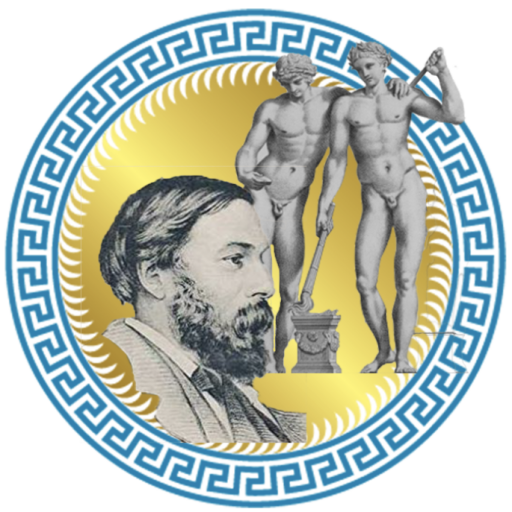by Shane Butler, Johns Hopkins University
© 2019

DESPITE the attention that A Problem in Greek Ethics has received in recent scholarship, the story of its genesis, various publications, and dissemination remains poorly told. The following is meant to provide some basic coordinates.
But what is more important, I composed the first draught of an essay on Greek Love.
Memoirs, 339
So Symonds reports in a section of his Memoirs dedicated to a period spent in Cannes from October 24, 1867 to January 30, 1868. He would remember the period as one of the darkest he had ever faced:
All the evil humours which were fermenting in my petty state of man—poignant and depressing memories of past troubles, physical maladies of nerve substance and of lung tissue, decomposition of habitual creeds, sentimental vapours, the disappointment of the sexual sense in matrimony, doubts about the existence of a moral basis to human life, thwarted intellectual activity, ambitions rudely checked by impotence—all the miserable factors of wretched inner life, masked by appearances, the worse for me for being treated by the outside world of illness in a well-to-do and idle citizen, boiled up in a kind of devil’s cauldron during those last weeks at Cannes, and made existence hell… I contemplated suicide.
Memoirs, 340–1
All this was written decades later, since it was only in March 1889 that Symonds wrote to his old friend Henry Graham Dakyns to announce, “I have begun scribbling my own reminiscences” (Letters 3:364 [1709]). But into his manuscript Symonds also pasted several texts written at the time of the events he is describing. Among these is one, seemingly cut from a letter, inserted just after the sentence about the “essay on Greek Love”:
I have been busy, and have greatly tired myself by writing an essay on Platonic Love. To do so has been often in my mind, and some time ago I collected the materials for it, but had to lay the work aside. My object is to explain the feelings of the Greeks about passion, to show how paiderastia was connected with their sense of beauty, and how it affected their institutions. It is not by any means finished. I am once again compelled to lay my pen down breathless. The subject appeals too deeply to my sympathies, while its more repulsive aspects are painful. I stumbled on till I came to grief in my brain. You cannot understand how intolerable it is to be devoid of physical power—not to be able to use the eyes for assiduous study or the brain for prolonged processes of thought. I often think that if I had force enough to work over and over again at expression, I might produce more satisfactory results. The essay on Platonic Love, for example, I knew to be defective. But I dare not attempt the labour. My brain will not stand it; I lose my sleep; my stomach refuses to act; and obscure aching pressure on the top and front of the head grinds me down; my eyes become inflamed and feel as though they were filled with sand.
Memoirs, 340
Among Symonds’s visitors in this period of torment and fitful effort was his friend Henry Sidgwick, the philosopher. From a letter from Symonds to Blanche Smith Clough, wife of the author Arthur Hugh Clough, written from Cannes on January 22, 1868, we learn that Sidgwick had read—and evidently praised—Symonds’s new essay:
Since this illness began I have read and of course have written nothing. Yet I have so much both to read and write. One little piece of satisfaction I got from Sidgwick who read an essay of mine written this winter on ‘Platonic Love’ among the Greeks, and who told me it ought to create a change in the opinion of scholars respecting some social questions of Greek history. I cannot publish it, and I do not wish any one to know I have written it except my most intimate friends.
Letters 2:790 (580)
Thereafter, however, the essay slips from view in the surviving correspondence. There is a possible mention of it in a letter from March 1872 (Letters 2:210 [823]), though the editors of the Letters take this to refer more likely to work on Studies of the Greek Poets, the first volume of which would be published in 1873. The two works, to be sure, were closely related, as Symonds makes clear immediately after the pasted-in excerpt from Cannes in the Memoirs, describing the afterlife of his “essay on Platonic love”:
The essay remained in MS. for a long while. Part of it I used for my chapter, in Studies of the Greek Poets, on the Greek Spirit. The rest I rewrote in Clifton in 1874, and privately printed under the title of A Problem in Greek Ethics.
Memoirs, 340
The UCLA copy of the privately printed pamphlet (on which more in a moment) includes a handwritten note, in Symonds’s hand, which originally gave the date of 1873 for the rewriting, though he then corrected it to 1874:
This essay was written at Clifton Hill House about 1874 [corrected from 1873], printed [by] Ballantyne and Hanson at Edinburgh in 1883.
Symonds would revert to the 1873 date for the first footnote of the version of the essay he revised for Sexual Inversion (to which we shall also return), first published in English in 1897:
The following treatise on Greek Love was not composed for the present volume. I wrote it in the year 1873, when my mind was occupied with my Studies of Greek Poets.
That account, reproduced (as a Preface) in later reprintings of the text, has led most scholars to give 1873 as the essay’s date of composition, although, as we have seen, its origins were earlier and Symonds seems to have been, in what would be the final years of his life, somewhat unsure whether its definitive revision had occurred in 1873 or 1874.
IN 1883, Symonds finally had the work printed, in a limited private edition of just ten copies, by the press of Ballantyne and Hanson, in Edinburgh. Symonds records in his Memoirs that a typesetter wrote him in protest over the contents:
While it was passing through the press of Messrs Balantyne and Hanson—ten copies only being printed for the author’s use—a compositor wrote to upbraid me for my iniquity.
Memoirs, 43
In fact, neither press’s name nor Symonds’s own appears in the printed pamphlet, the title page of which reads simply “A Problem in Greek Ethics, Ten Copies Privately Printed for the Author’s use, 1883.”
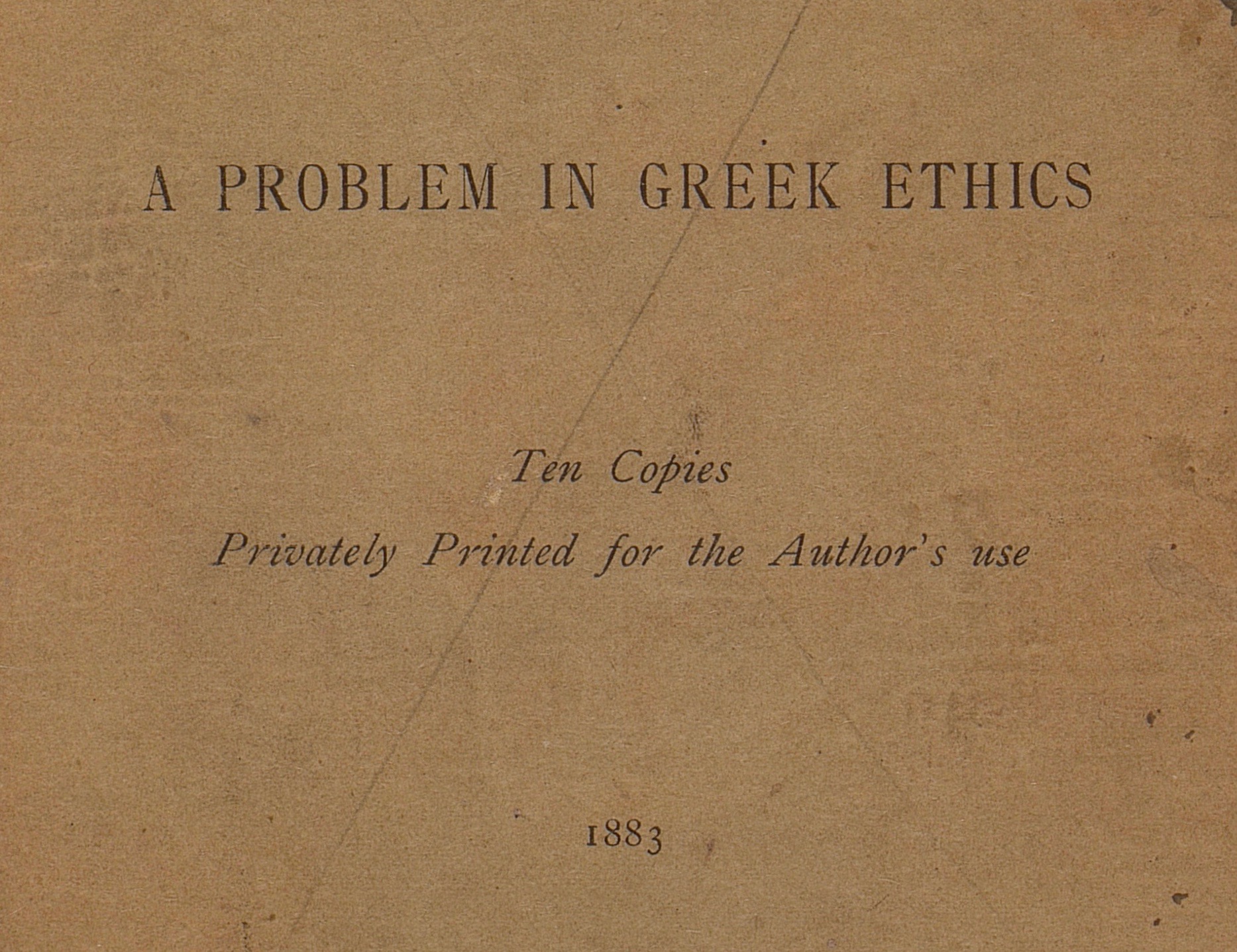
Over the years to come, Symonds would share his copies with a widening circle of potentially sympathetic readers, a circulation partly documented in his surviving Letters, where the earliest reference to the printed essay comes in a letter of February 1884 to the American editor and scholar Thomas Sergeant Perry:
I have felt this much during the past Summer, having been engaged part of the time in preparing for press and privately printing a long-meditated dissertation on some aspects of Greek social life. The mere verification of quotations and examination of translations gave me pleasure, by carrying me over so much of the Holy Land of Literature.
Letters 2:881 (1372), to T. S. Parry (Davos: February 2, 1884)
Even this vague description seems to have been enough to pique Perry’s interest in his reply, to which Symonds replied in turn with an extended description of his fear of allowing the essay “publicity”:
The essay on Greek Manners which I told you I had printed privately is an attempt to analyze the social conditions and philosophical conceptions out of which Plato’s theory of love as set forth in the Phaedrus and Symposium emerged, and to compare that ideal with the medieval ideal of Chivalrous Love. You will understand from this description the reasons why I do not wish to give this study publicity.
Letters 2:895–6 (1381), to T. S. Perry (Davos: March 22, 1884)
Symonds blames his reluctance on English hypocrisy, especially regarding the Greeks:
Unfortunately the English public is almost totally devoid of scientific curiosity. They cannot understand (no: not even after all that Darwin and Spencer have done for demonstrating the necessity of studying humanity in evolution)—they cannot understand that a man may take a philosophical interest in a subject for which he has no moral sympathy, and may think that worth analysis from which he would shrink in practise. They go on putting the Greek classics in the hands of their sons and encouraging the most hopeful youth of both sexes to penetrate its uttermost recesses. But they exact total silence upon the most significant anomaly in the life of the most brilliant race which ever occupied our globe—the race which has inaugurated nearly all our intellectual methods.
ibid
The painfully cautious language about his own “moral sympathy” with his subject matter is clearly designed to protect Symonds should Perry himself prove to be less sympathetic that he hoped. Nevertheless, the author cannot quite contain his pride at the essay’s accomplishment:
This essay is considerable in size: about 100 closely printed pages: and is the most learned of my writings. But I suppose it will never be read by anybody, even though it has been printed.
ibid.
Despite this last, gloomy pronouncement, Perry insisted. In July, Symonds began to give in:
Do you really want my essay on Greek Morals? You must remember that it is practically an enquiry into the origin, development, and social relations of that unmentionable custom which perplexes every student of Plato. It is really dangerous in England to allude to such a subject, though every boy who gets a classical education becomes familiar with it. I shudder to think what the result would be if I were to divulge my treatise to the public—wholly analytical and scientific as its tone is. If after this warning you would still like to read it, I will send it, trusting to your discretion.
Letters 2:934 (1408), to T. S. Perry (Davos: July 30, 1884)
Perry eventually got his wish, though perhaps after further waiting. We learn of his reaction in a letter sent by Symonds four years later:
I do not think I have any questions to ask about the subject of my essay. It is clear that I must get hold of Meyer’s article on Paederastie, and study it thoroughly, before I take steps of any kind.
Letters 3:302 (1657), to T. S. Perry (Davos: March 27, 1888
The article in question was M. H. F. Meier, “Päderastie,” in J. S. Ersch and J. G. Gruber, eds., Allgemeine Encyclopädie der Wissenschaften und Künste, Section 3, Bd. 9 (Leipzig, 1837). Symonds continues, referring to Meier’s article:
If it is as complete as you report (and of this I can have no doubt), the necessary work has already been done. Information is accessible to scholars. And I think I shall be wise to keep my own essay in obscurity. I shall not, however, let it lie by, particularly after what you have said upon the subject. On the contrary, I will go through the whole matter again, whenever I can get at Meyer’s article—at Zürich perhaps—and at some other books which bear upon the topic which I have just got. I can then [form] a judgment whether my essay possesses any independent value.
ibid.
The exchange with Perry (a copy of whose 1890 A History of Greek Literature was in Symonds’s library, perhaps along with other works by him) can stand for what clearly was extensive but discreet circulation of the essay, initially orchestrated by Symonds but surely also embracing the friends of his friends, and so on. (Further research in this area is a future goal of JASP.) Perry’s American address is also conveniently indicative of just how global the reach of “private” publication could be.
Nevertheless, even as the essay’s ten copies made their way from one carefully selected reader to another, and despite learning that some of his work had been anticipated by Meier, Symonds did not lose sight of the value of broader dissemination. Years later, he devised an ambitious plan to this end.
HAVELOCK Ellis and Symonds never met in person. The only contact was by a correspondence that began in late 1885, when Ellis sent Symonds a copy of his essay “The Present Position of English Criticism,” published in Time, which praises Symonds for his “keen and restless intellectual energy.” Symonds’s reply opens in stark reminder of his isolation in Davos:
Dear Mr Ellis
Thank you very much for your essay on English Critics. But for your kind thought of sending it, I should probably in this benighted place have missed it altogether.
Letters 3:98 (1506), to Havelock Ellis (Davos: December 7, 1885)
Ellis likely already had Symonds in his sights as a possible collaborator in a major new publication project: the “Mermaid Series” of reprinted Elizabethan, Jacobean, and Restoration dramas, which would begin appearing in 1887, with Ellis as general editor. Months after making contact, he had secured Symonds’s advice and promised help; among other contributions, Symonds would edit the volume on Webster and Tourneur (1888).
In 1890 Ellis published The New Spirit, which offered essays on several writers, including Walt Whitman. He sent a copy to Symonds, who wrote back with thanks and praise but also with an extended request for more clarity regarding Ellis’s views on Whitman, concluding as follows:
In one word, does Whitman imagine that there is lurking in manly love the stuff of a new spiritual energy, the liberation of which would prove of benefit to society? And if so, is he willing to accept, condone or ignore the physical aspects of the passion?
Letters 3:459 (1791), to Havelock Ellis (Venice: May 6, 1890)
A few months later, Symonds wrote Whitman himself for an answer to similar questions. Whitman’s now notorious reply, violently rejecting a sexual interpretation to the “love of comrades,” was crushing for Symonds. But Ellis instead proved to be something of an ally. In 1892 Symonds wrote his friend Arthur Symons, the writer and editor, to ask him to sound Ellis out about a possible new project:
[W]ill you ask Havelock Ellis if he would take a book from me on “Sexual inversion” for his Science Series? I have written and privately printed two essays on the phenomenon in ancient Greece and modern (contemporary) Europe. These could very well be fused; and the historical study of Greece is absolutely essential to the psychological treatment of the subject now. It is being fearfully mishandled by pathologists and psychiatrical professors, who know nothing whatsoever about its real nature.
Letters 3:691 (1982), to Arthur Symons (Davos: June 13, 1892)
When Ellis wrote to suggest, instead, a collaboration, Symonds responded with enthusiasm:
I was very glad to receive your letter of the 1st and to learn from it that you think we might do something together about Sexual Inversion. Had I known that you were seriously contemplating a special study of Sex phenomena, I should not have written to you in the way I did. I should have felt that to propose anything like collaboration would be an impertinence. However, now that you have met me so kindly, I look forward to discussing the subject with you and seeing whether anything can be done. I feel that, in a matter of this sort, two names, and two men of different sorts would be stronger as attracting public opinion than any one alone of any sort, and also would be more likely to get a wide and serious attention.
Letters 3:709 (1996), to Havelock Ellis (Davos: July 7, 1892)
With the same letter he enclosed one of the ten copies of A Problem in Greek Ethics:
I think it may be worth while to send you what I wrote some years ago about Greek Love. I have prepared it for republication with additions, alterations and translations of the Greek quotations. But it is more convenient not to send these extra MSS. The copy I do send belonged (as you will observe) to Sir [Richard] Burton, and was returned to me by Lady Burton after his death. Please let me have it again some time.
In my view, no survey of Sexual Inversion is worth anything without an impartial consideration of its place in Greek Life.
ibid.
The sometimes fraught dynamics of this collaboration have been told by others and will not detain us here. Within a year, Symonds was dead, leaving Ellis to decide what to do with his collaborator’s materials, including (though hardly limited to) the reworked essay.
ONE of Ellis’s most dramatic innovations was the decision to publish the book first in German translation. One goal seems to have been to reach an established readership of German sexologists; another, however, must have been an attempt to pave the way for what Ellis doubtless knew would be a more volatile reception in Britain. Das konträre Geschlechtsgefühl was published in Leipzig in 1896, with both authors’ names on the cover and title page (though not, as Symonds had hoped, with his own name first), as part of the series Bibliothek für Socialwissenschaft, edited by Hans Kurella.
A Problem in Greek Ethics, retitled as “Der Homosexualität in Griechland” (Homosexuality in Greece), forms the third chapter of this German edition, with a footnote indicating, “Das Kapitel stammt ganz aus der Feder von G. A. Symonds,” “This chapter comes entirely from the pen of G. [sic] A. Symonds.” The placement corresponds roughly to the plan agreed to by Symonds himself in his last surviving letter on the subject:
Chapter ii. History in Greece. This might well be my own Essay, as you say…
Letters 3:788 (2062), to Havelock Ellis (Davos: December 1, 1892)
IN April 1897, Sexual Inversion at last appeared in English, as the first volume of the series announced on its half-title as, “Studies in the Psychology of Sex, by Havelock Ellis.” For the English edition, among other reductions of Symonds’s prominence in the book, Ellis had demoted A Problem in Greek Ethics from its key position as chapter three to the book’s back matter, where it comprises “Appendix A”:
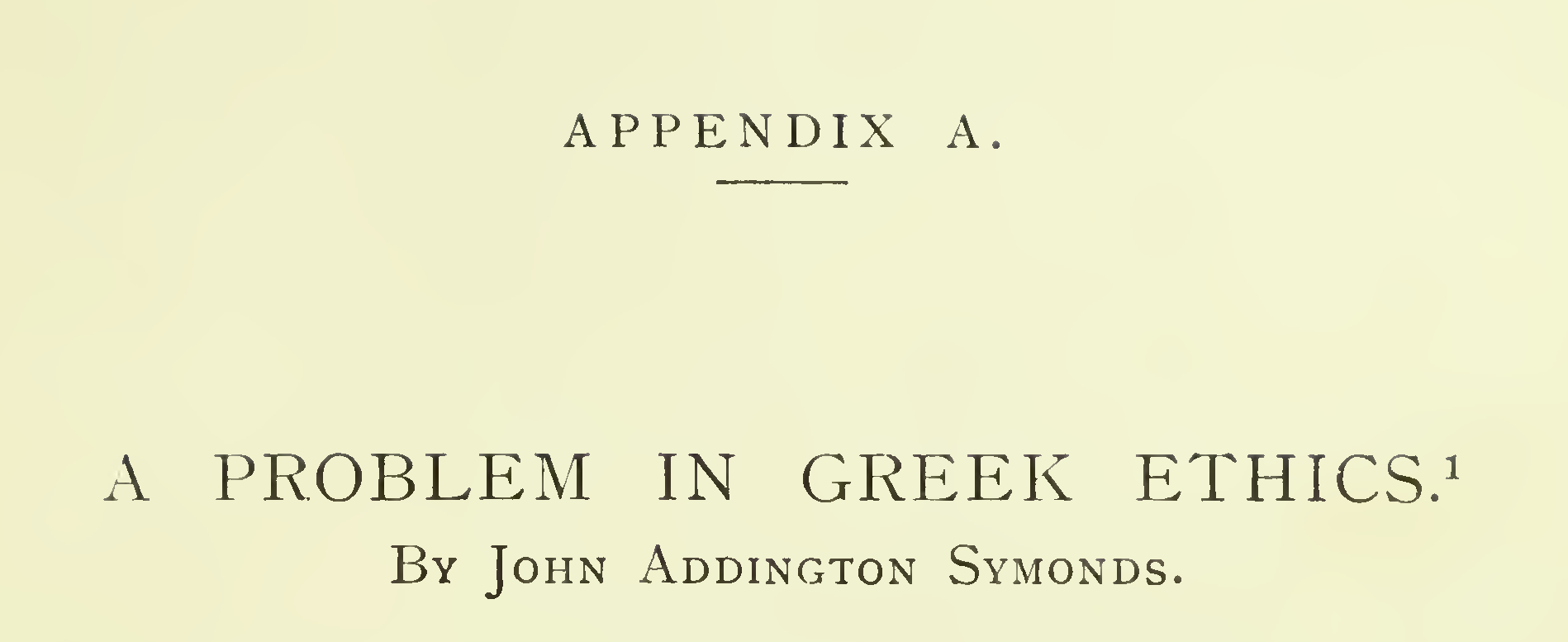
Nevertheless, Symonds’s name still appears on the book’s main title page, after Ellis’s:
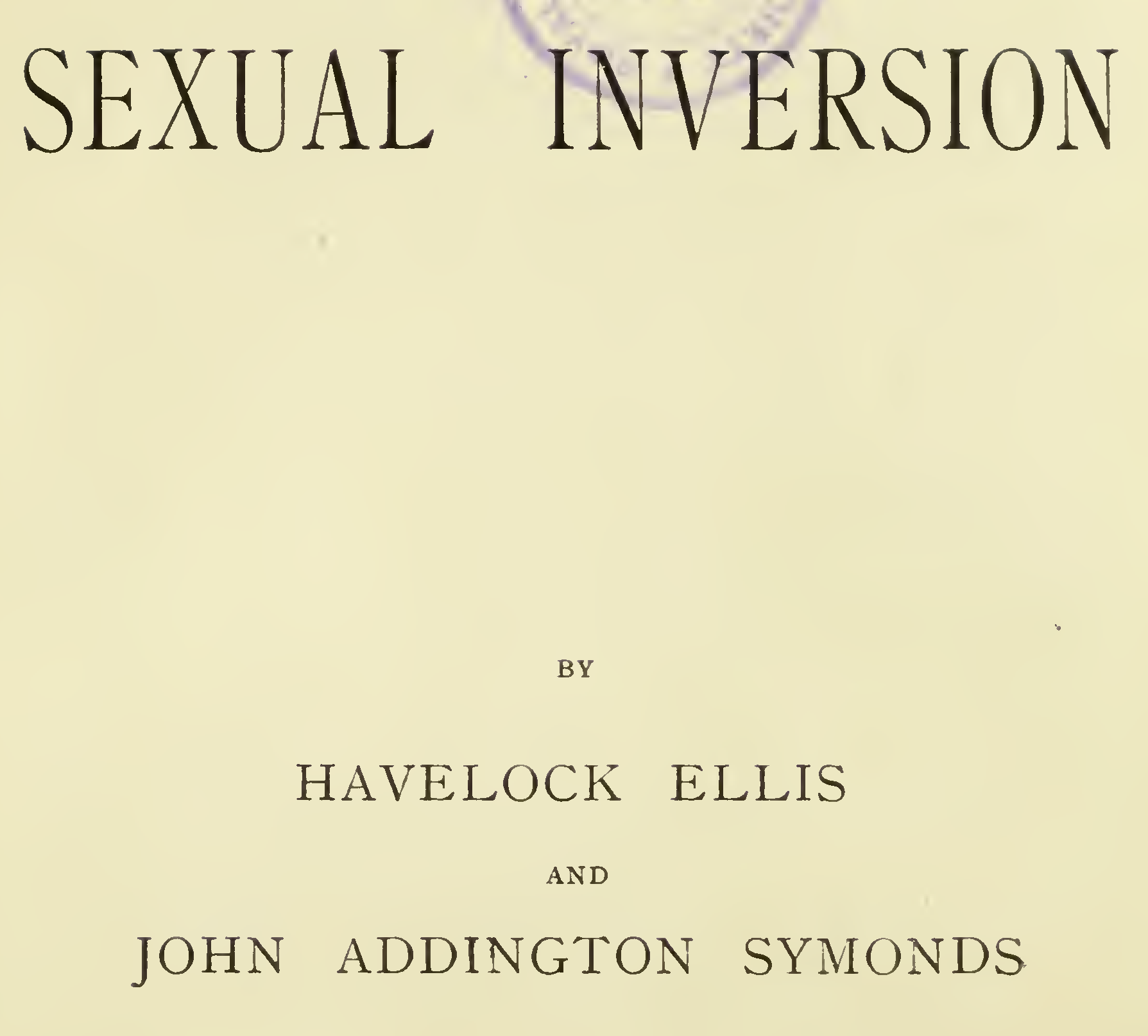
This is followed by the book’s publication details:
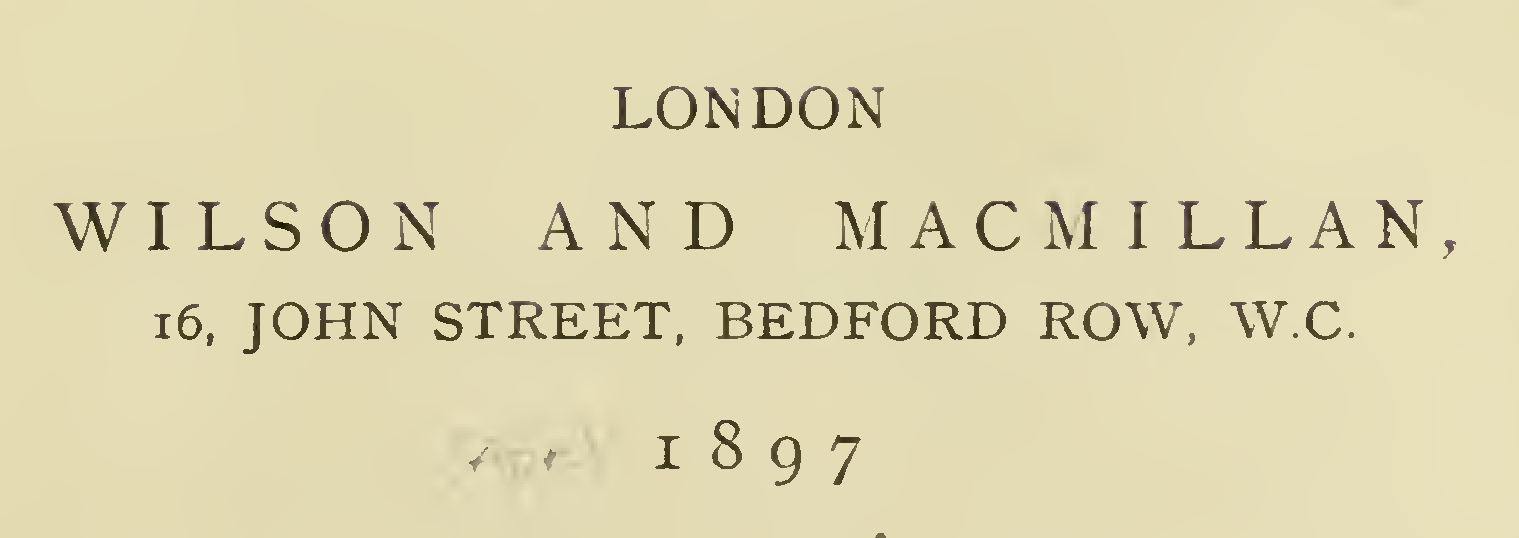
“Wilson and Macmillan,” however, did not exist; the grand-sounding imprint was invented to shield the actual publisher (on whose identity, more below) from legal action for obscenity. The negative reaction was, in fact, swift; it came, however, not from the authorities but, rather, from Symonds’s family, which prevailed upon his literary executor, Horatio Brown, to have the book suppressed. Brown bought up and destroyed all the copies he could, though a few survive, including one at Johns Hopkins used by JASP and another at the Wellcome Library in London, available on their own website and in the Internet Archive (source of the images above):
UNBOWED, Ellis brought out a second edition in October 1897, stripped, on the title page and elsewhere, of any explicit evidence of Symonds’s collaboration. A Problem in Greek Ethics was removed entirely. Once again, the purported publisher was pure invention:
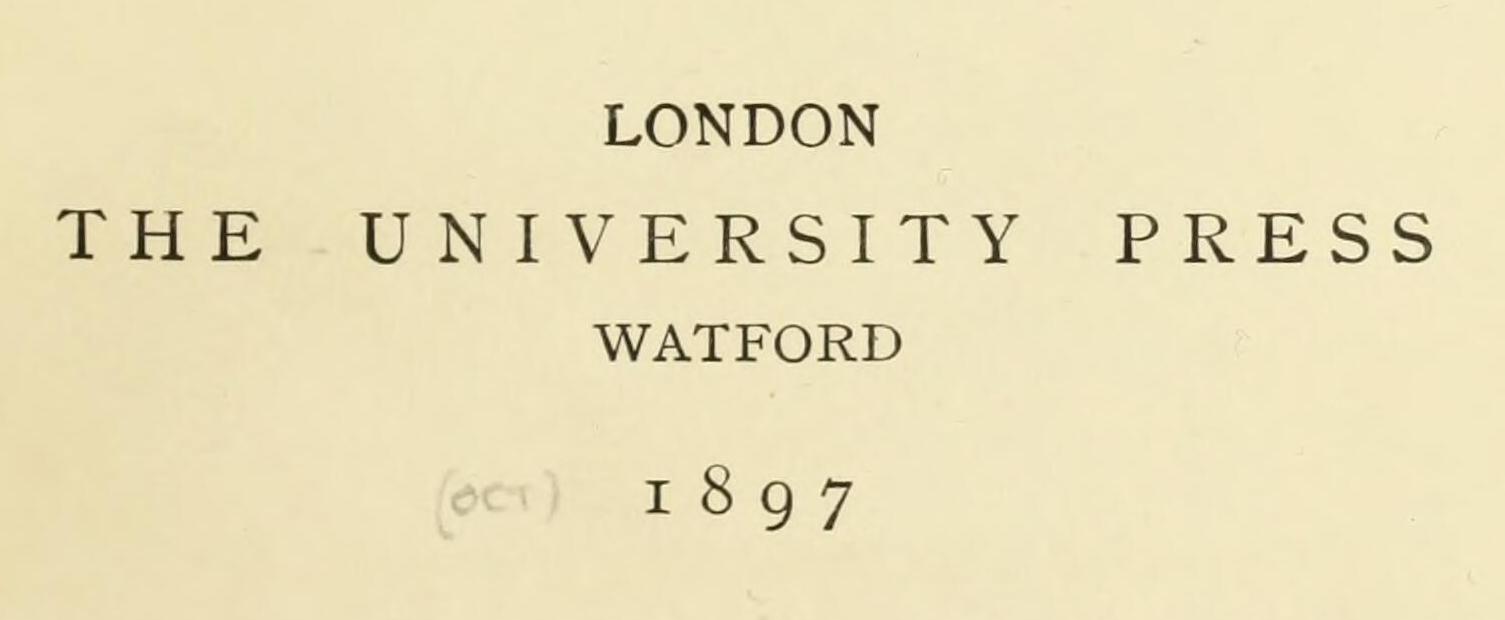
The actual printer was the extraordinarily colorful George Ferdinand Springmühl von Weissenfeld (one of several names he used), who had also been responsible for the first edition. This second edition would soon figure in the 1898 prosecution of London bookseller and sex reformer George Bedborough, who had sold a copy of Sexual Inversion to an undercover officer, leading to his arrest for “publishing an obscene libel.”
Ellis did not give up. Between 1901 and 1928 he published the entire planned series in Philadelphia, having repositioned Sexual Inversion (to which Symonds’s essay would never return) as its second volume.
NEVERTHELESS, A Problem in Greek Ethics was not forgotten. In 1901 it was published as a standalone volume, with the title A Problem in Greek Ethics, Being an Inquiry into the Phenomenon of Sexual Inversion, Addressed Especially to Medical Psychologists and Jurists. Symonds is named as the author, followed by the imprint “London 1901,” without the name of a publisher or printer.
Facing the title page is a declaration that “One Hundred Copies only of this Book have been printed (for Private Circulation, and the type has been distributed,” followed by a dotted blank for indicating the number of the copy.

Some surviving examples include handwritten numbers, which could have been added at any point, but most are blank, and the sheer number of copies one can locate in libraries and for sale makes it clear that the claim to a strictly limited run is false. The claim doubtless was made in a bid to avoid obscenity charges, and the same motivation probably lies behind the extension of the title to specify an audience of medical and legal specialists.
Who was responsible for this edition? Percy L. Babington, in his Bibliography of the Writings of John Addington Symonds (London: John Castle, 1925), p. 210, describes this edition as a “surreptitious reprint” and cites the claim of Thomas Mosher (The Bibelot, vol. 12, p. 385) that it was “privately printed for Leonard Smithers, London, 1901.” Mosher also alleges that Smithers was the printer of an 1896 edition of A Problem in Modern Ethics, but Babington notes (p. 208) that he has “never seen any copy with Smithers’ name in the volume, as Mosher implies,” although he adds that “Mr. [Horatio] Brown compelled compelled Smithers to suppress an edition, and to pay damages.” Likewise, Smithers appears nowhere in the 1901 printing of A Problem in Greek Ethics, and while his identification by Mosher as its printer is hardly impossible, in the absence of independent verification, one wonders why Smithers would have again risked antagonizing Brown.
What is clear is that the 1901 text reproduces that of the first, suppressed, April 1897 edition of Sexual Inversion. While copies of this may not have been impossible to come by, one cannot help wondering whether Ellis had a hand in at least encouraging the republication, which offered some compensation for the omission of the essay from the volume in which Symonds had hoped it would at last reach a wider audience.
A second, similar republication came in 1908.
This one bears the imprint of “The Areopagitiga [sic] Society, London, 1908″; the verso of the title page indicates that it was “Printed Privately in Hollana [for “Holland”] for the Society.”
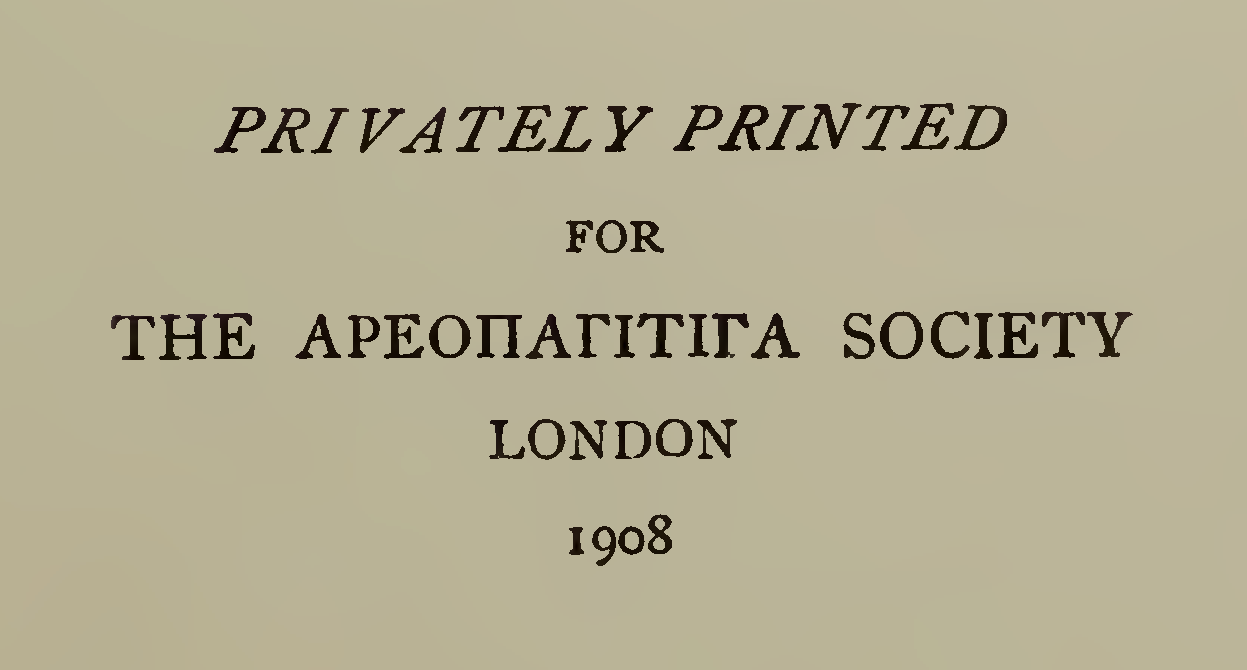

Both the society and the Dutch printing are more fictions intended to deflect the risk of prosecution.
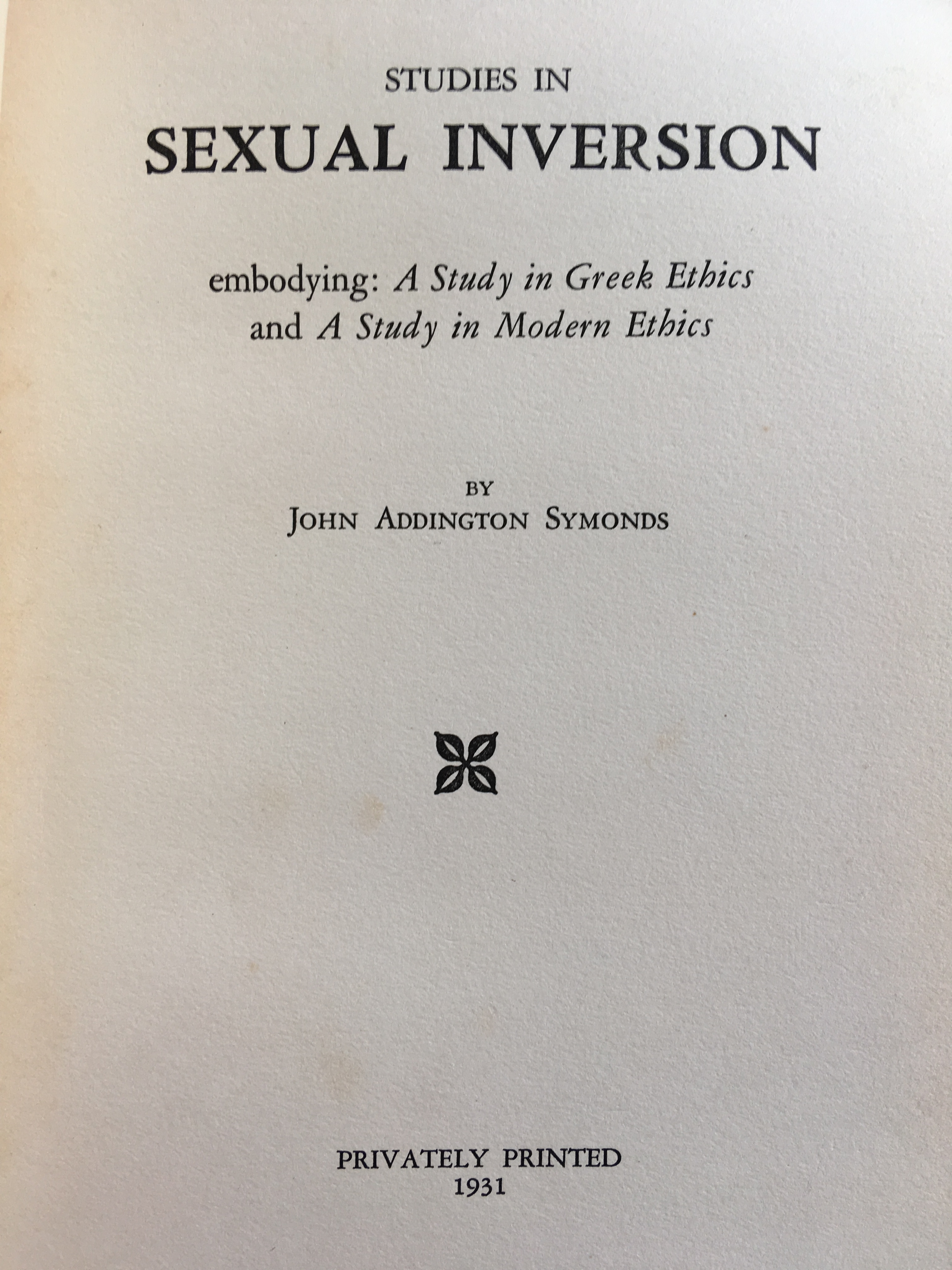
TWO decades later, A Problem in Greek Ethics and A Problem in Modern Ethics, appeared for the first time between the same two covers, in a volume titled Studies in Sexual Inversion. It too was “privately printed” (in 1928 and again in 1931).
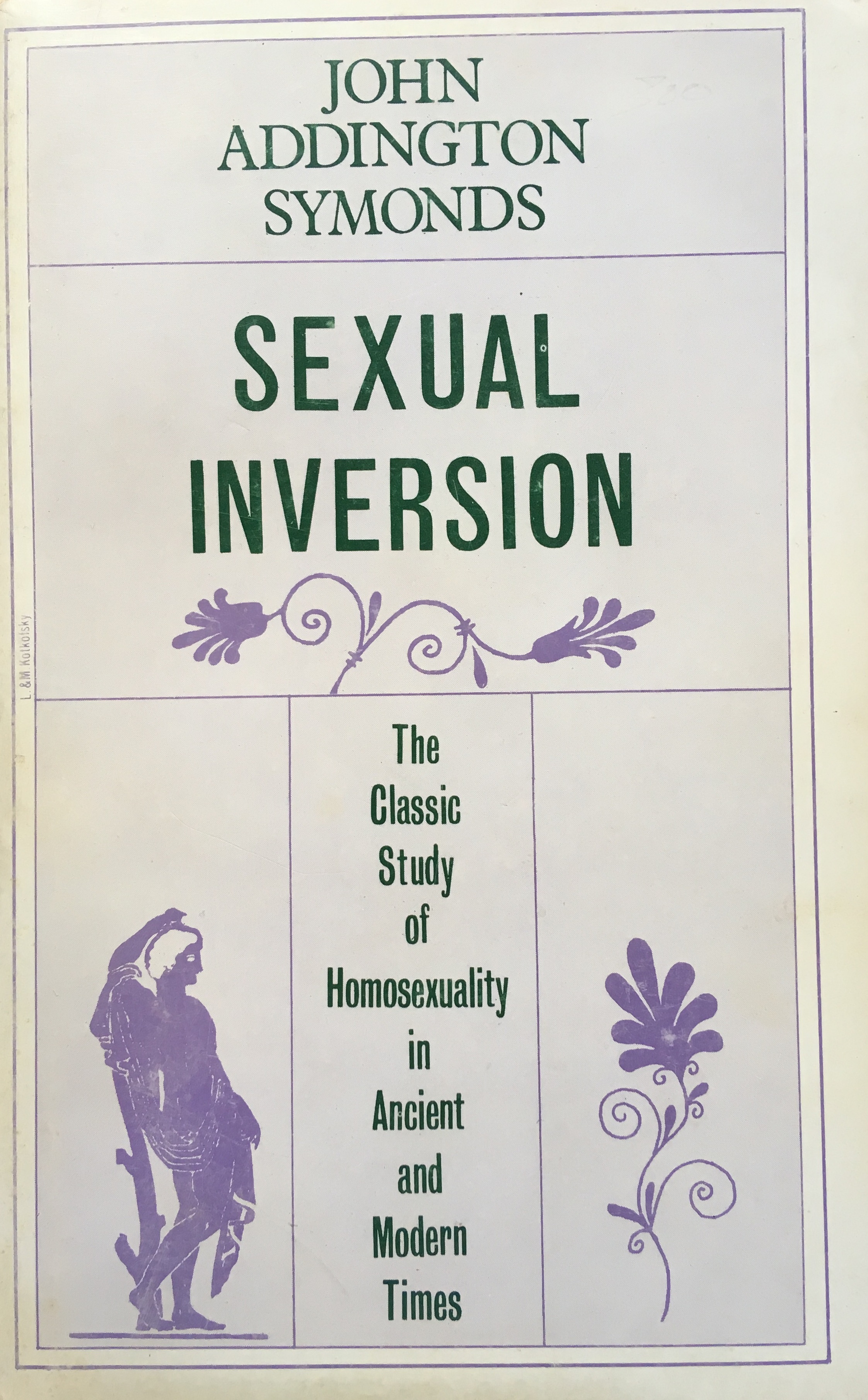
The 1928 edition was reprinted unaltered in 1964 (the year of the publication of Phyllis Grosskurth’s biography of Symonds) by The Medical Press of New York, which, despite its solemn name, specialized in risqué material. Striking is the way in which its title makes the paired essays, with their origins in classical scholarship, into a “classic” work in its own right: Sexual Inversion: The Classic Study of Homosexuality in Ancient and Modern Times.
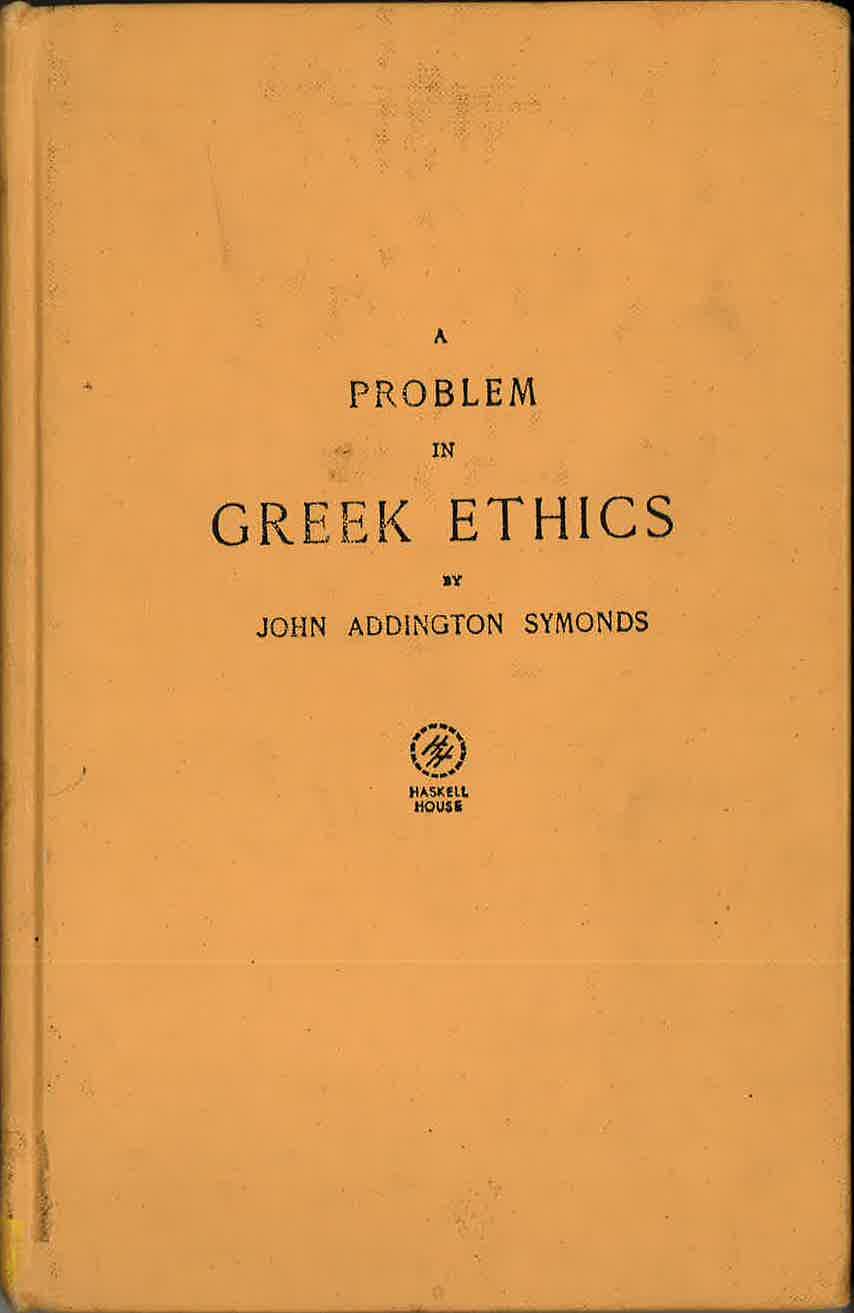
In 1971 Haskell House Publishers, described on the title page as “Publishers of Scarce Scholarly Books,” brought out a facsimile of the 1901 edition. The copy shown used to belong to the Los Angeles Public Library (stamped with an acquisition date of April 13, 1972), whose bookplate it contains, where it is designated as a third copy and stamped “May Be Loaned,” both of which seem to suggest high demand. One factor possibly driving the demand was the 1969 Stonewall Rebellion in New York.
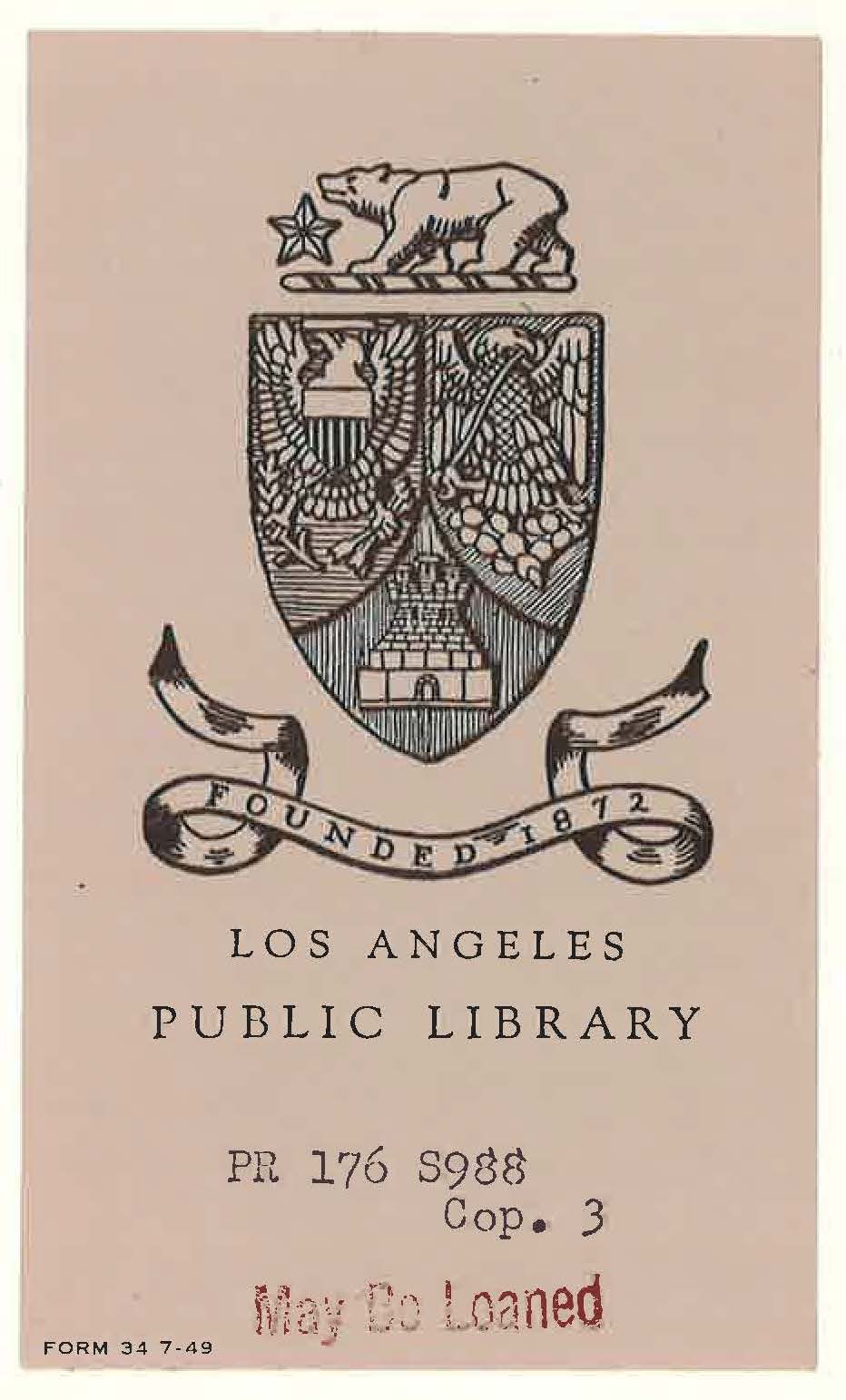

A facsimile of the full first edition (April 1897) of Ellis and Symonds, Sexual Inversion, including the appendix with A Problem in Greek Ethics, was published in 1975 by the Arno Press, “A New York Times Company,” in the series “Homosexuality: Lesbians and Gay Men in Society, History and Literature” (called on the cover, “The Arno Series on Homosexuality”), edited by gay studies pioneer Jonathan Katz.
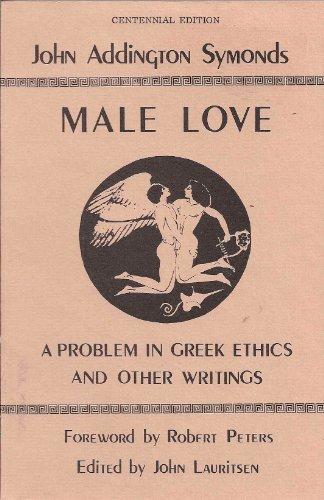
IN 1983, the 100th anniversary of its first printing of A Problem in Greek Ethics, the essay became the second book published by the Pagan Press, “founded in 1982 to publish books of interest to the intelligent gay man.” This was the first publication of the essay that did not use private printing, fictitious imprints, or the cover of “medical” literature in order to avoid suppression. The book was named by The Advocate as one of the ten best gay books of 1983.

Meanwhile, the paired essays continued to be reprinted. The edition shown is by the Bell Publishing Company, New York, 1984.
The first online version of the text seems to have appeared in 1997, on the website of scholar (and Symonds enthusiast) Rictor Norton, who collated the copy of the 1883 pamphlet in the British Library with copies of the 1897 edition of Sexual Inversion and of the 1901 private printing, carefully documenting the differences.
Digital facsimiles of the various early editions (though not of the 1883 pamphlet) have appeared in Google Books and other repositories, and an eBook version of the 1908 text was produced by Project Gutenberg in 2010.

The 1897 text appears in Ivan Crozier’s 2008 edition of and commentary on Sexual Inversion.

Both the 1883 text and the 1897 text are instead represented in the edition of the essay in Sean Brady, ed., John Addington Symonds and Homosexuality: A Critical Edition of Sources (Palgrave Macmillan, 2012).
Finally, in 2019, JASP generated and posted the hyperlinked version of the 1897 text available on this website.

